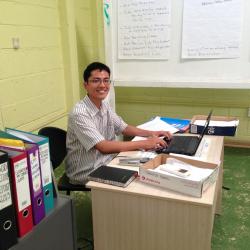News
Adventures of a SPBD Tonga Intern – Part 2
Mālō e lelei (hello in Tongan),
I have just finished a jam-packed first week with SPBD Tonga and I am writing this blog update to give everyone a recap of my experience so far.
As mentioned in my previous post, I have been accompanying one of SPBD’s Field Teams on their daily visits to SPBD’s borrower centers. At each center, I have been administering a short survey to gauge potential demand for various new micro-credit, savings and insurance products.
After visiting 14 centers and talking to over 200 women, I have made a few interesting observations that I would like to share.
My first observation is that SPBD’s clients face significant barriers to accessing traditional financial services. A key theme that has emerged from my conversations with SPBD’s clients is that traditional banks are too expensive. Many clients complained that, without SPBD, they would not have been able to save due to the high fees charged by traditional banks. In addition, clients living in remote villages or one of the smaller islands faced significant transportation costs to get to a bank branch in the nearest town. Without the weekly visits made by SPBD’s field officers, many clients would have found it uneconomical to use formal financial services.
My second observation is that clients are extremely entrepreneurial. Aside from having the entrepreneurial spirit to set-up successful businesses, SPBD’s clients often find ingenious solutions to the market’s failure to provide essential goods and services. One example is their solution to a lack of access to financial services. Before SPBD’s arrival, low-income women would establish ‘community savings funds’ to provide an avenue to save and borrow in their community. This way, families who needed money to cover large expenses could borrow, while other families with excess money could save and earn an interest on it. This display of ingenuity challenges the conventional view held by some in society, who often think of the poor as being lazy or unimaginative.
My third observation is that the Tongan people are incredibly welcoming. One of my biggest concerns was that women at the borrower centers would be suspicious of a complete stranger, who does not speak Tongan, intruding in their weekly meetings. However, I found the exact opposite. At almost every meeting, I was welcomed with wide smiles and friendly greetings. The women were extremely open and happily answered all my questions. At a number of meetings (more than you expect), the women even cheekily joked whether I could find them a husband in New Zealand! Unfortunately, since my plate was already full from my SPBD duties, I had to turn down their requests.
So these are the main observations I have made so far during my time with SPBD. It has been (and will continue to be) an amazing and eye-opening experience. Every day, I am meeting people and having conversations that challenge my conceptions of how the world works.
To any students or young professionals interested in microfinance, I urge you to get in contact with SPBD. They are always looking for energetic and passionate interns to help them drive their mission forward.
Plus, spending a few weeks at a tropical designation in the Pacific would not be the worst way to spend your summer! Until next time.
Nofo ā (bye in Tongan),
Alexander Li
Undergraduate student at the University of Auckland
President of the Auckland Microfinance Initiative




